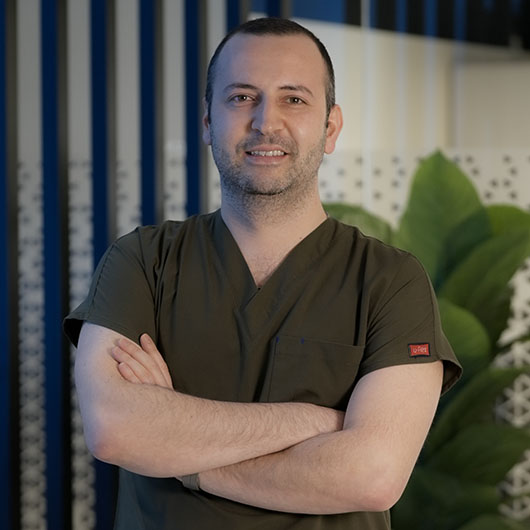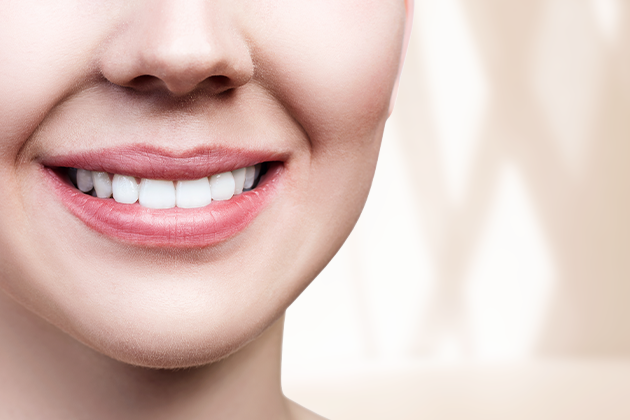Periodontics
Periodontics is a branch of dentistry that deals with the diseases of the gums, the bone tissue that supports the teeth, and the supporting structures around the teeth (cementum, periodontal ligament, and alveolar bone). Those who have completed doctoral education and received specialization in this field are called periodontists. Periodontal diseases occur as a result of the accumulation of a sticky film called bacterial plaque on the surfaces of the teeth and its attachment to the gum tissue. Over time, the plaque mineralizes and hardens, forming tartar or dental calculus. Inflammation and irritation of the gums can lead to gum recession, weakening of the supporting tissues of the teeth, and even tooth loss.
Periodontics
- What is Periodontics?
- What Are Periodontal Diseases?
- What Are the Treatment Methods for Periodontal Disease?
- What Are the Causes of Gum Diseases?
Periodontics
Periodontics is a branch of dentistry that deals with the diseases of the gums, the supporting bone structure of teeth, and the supporting tissues surrounding teeth (cementum, periodontal ligament, and alveolar bone). Individuals who have completed doctoral education and obtained expertise in this field are referred to as periodontists. Periodontal diseases occur as a result of an adhesive film layer called bacterial plaque accumulating on the surfaces of teeth and settling into the gum tissue. Plaque eventually mineralizes and hardens, becoming tartar or dental calculus. Inflammation and irritation of the gums can lead to gum recession, weakening of the supporting tissue of the teeth, and even tooth loss.
Periodontics is an essential part of oral health and aims to preserve healthy teeth, maintain oral tissue health, and protect overall health. Regular dental check-ups and good oral hygiene habits play a significant role in preventing periodontal diseases.
Periodontal Diseases
- Gingivitis: Gingivitis is a condition where the gums become inflamed. It is often caused by the accumulation of plaque and bacterial infections. The gums may appear red, swollen, and bleed, but gum recession or permanent damage has not yet occurred. Gingivitis can often be reversed with good oral hygiene practices and professional dental cleaning.
- Periodontitis: If gingivitis is left untreated, the inflammation of the gums can spread to the supporting bone tissue of the teeth, leading to a more severe condition called periodontitis. Periodontitis is characterized by symptoms such as gum recession, loose teeth, the formation of gum pockets, and bone loss. In advanced stages, it can result in tooth loss. If periodontitis is not treated, the disease can progress and cause permanent damage.
- Periodontal Abscess: A periodontal abscess is a serious condition that occurs due to infection and the accumulation of pus in periodontal pockets. Symptoms may include severe pain, swelling, sensitivity, gum recession, loose teeth, bad breath, and even fever. This condition requires immediate treatment.
- Gum Pockets: Gum pockets are deep crevices that form around teeth. Plaque buildup can easily accumulate in these pockets, contributing to the progression of periodontal diseases.
- Gum Recession: Gum recession is characterized by the exposure of the root surfaces of teeth. It can lead to weakening of the supporting tissues of the teeth and tooth sensitivity. Factors contributing to gum recession include improper tooth brushing, genetic factors, habits like teeth grinding or clenching, and periodontal diseases.
- Aggressive Periodontitis: Aggressive periodontitis is a condition often seen in young individuals. It is characterized by rapid damage to both the gum tissue and supporting tooth structures. It can frequently lead to tooth loss, making early diagnosis and treatment essential.
- Chronic Periodontitis: Chronic periodontitis is the most common type of periodontal disease. It progresses slowly and may manifest with symptoms such as gum recession, loose teeth, and bone loss. The gums are chronically inflamed, requiring treatment.
- Peri-Implantitis: Peri-implantitis refers to inflammation occurring in the tissues surrounding dental implants. Symptoms may include gum recession, bone loss, and implant loosening. Good oral hygiene is crucial, and if left untreated, this condition can lead to implant loss.
- Necrotizing Periodontal Disease: This rare and severe periodontal disease involves tissue death (necrosis) in the gum tissue. It presents with severe pain, bad breath, gum recession, and rapid progression, requiring urgent treatment.
Periodontal Treatment Methods
- Gum Cleaning (Scaling): This is a cleaning procedure to remove plaque and tartar buildup on the gums. A dentist or periodontist uses special tools to clean deposits between the gums and teeth. This procedure reduces gum inflammation and improves gum health.
- Root Planing: Root planing involves the removal of plaque and tartar beneath the gumline and smoothing the root surfaces. This process cleans bacteria from gum pockets and encourages healthy reattachment of gum tissue.
- Periodontal Surgery: In some cases, advanced damage to periodontal tissues may require surgical intervention. These surgical procedures include bone grafts, soft tissue grafts, cleaning and reshaping gum pockets, and bone restructuring. The goal is to improve periodontal tissues and regain lost bone and gum tissue.
- Antibiotic Treatment: In certain situations, oral or systemic antibiotics may be prescribed to control periodontal diseases. Antibiotics can help reduce infection and expedite healing. They are often used in conjunction with other treatment methods.
- Periodontal Maintenance and Follow-Up: Regular periodic check-ups and professional cleanings following periodontal treatment are essential to monitor the patient's periodontal health and evaluate treatment outcomes. The dentist or periodontist assesses the patient's oral health, evaluates gum condition, and recommends additional treatment or measures if necessary.
- Oral Hygiene Education: Patients are educated about proper oral hygiene habits to control periodontal diseases and prevent recurrence. They receive guidance on correct tooth brushing techniques, dental flossing, mouthwash use, and other effective cleaning methods. Additionally, quitting harmful habits such as smoking may be advised.
Factors Leading to Gum Diseases
- Accumulation of Plaque and Tartar: One of the primary causes of gum diseases is the buildup of bacteria, resulting in the formation of plaque and tartar. Plaque is a sticky layer formed by the combination of bacteria and food debris. Over time, plaque hardens into tartar and accumulates on the teeth. Plaque and tartar can lead to gum inflammation (gingivitis) and, if left untreated, progress to a more serious gum disease called periodontitis.
- Inadequate Oral Hygiene: Neglecting proper oral hygiene habits such as regular brushing of teeth and gums, using dental floss, and mouthwash can trigger plaque buildup and gum diseases. Inadequate oral hygiene increases plaque formation and bacterial growth, leading to gum inflammation.
- Smoking: Smoking increases the risk of gum diseases. Smoking disrupts blood circulation in the gums, weakens the immune system, and slows down the healing process. This accelerates the development of gum diseases and complicates the treatment process.
- Genetic Factors: Some individuals are genetically predisposed to gum diseases. People with a family history of periodontal disease may have a higher likelihood of developing gum diseases.
- Hormonal Changes: Hormonal changes, particularly during periods such as pregnancy or menopause, can increase the risk of gum diseases. Fluctuations in hormone levels can make the gums more sensitive and prone to inflammation.
- Diabetes: Diabetes is a condition that affects the control of blood sugar levels in the body. It can facilitate the development of gum diseases and complicate the treatment process. Additionally, diabetes can negatively impact blood sugar control in individuals with gum disease.
- Stress: Stress can weaken the immune system, increasing the likelihood of gum diseases. It can also reduce attention to oral hygiene practices, affecting gum health.
- Dietary Habits: Consuming foods with low nutritional value and excessive consumption of sugary and starchy foods can contribute to the development of gum diseases. Such foods promote bacterial plaque formation and gum inflammation.
- Toothbrushing Technique and Hardness: Incorrect toothbrushing techniques or using a toothbrush that is too hard can cause injuries and gum recession. This can lead to gum sensitivity and diseases.
- Ill-Fitting Fillings or Prosthetics: Poorly fitting fillings or prosthetic devices can lead to plaque buildup and gum inflammation, triggering the development of gum diseases.
- Oral Breathing: Breathing through the mouth due to conditions like nasal congestion or sleep apnea can lead to dry mouth and gum diseases. Dry mouth increases bacterial buildup, contributing to gum inflammation.
Doctors
List of doctors under the HOP of the corporation















-.png)


.png)